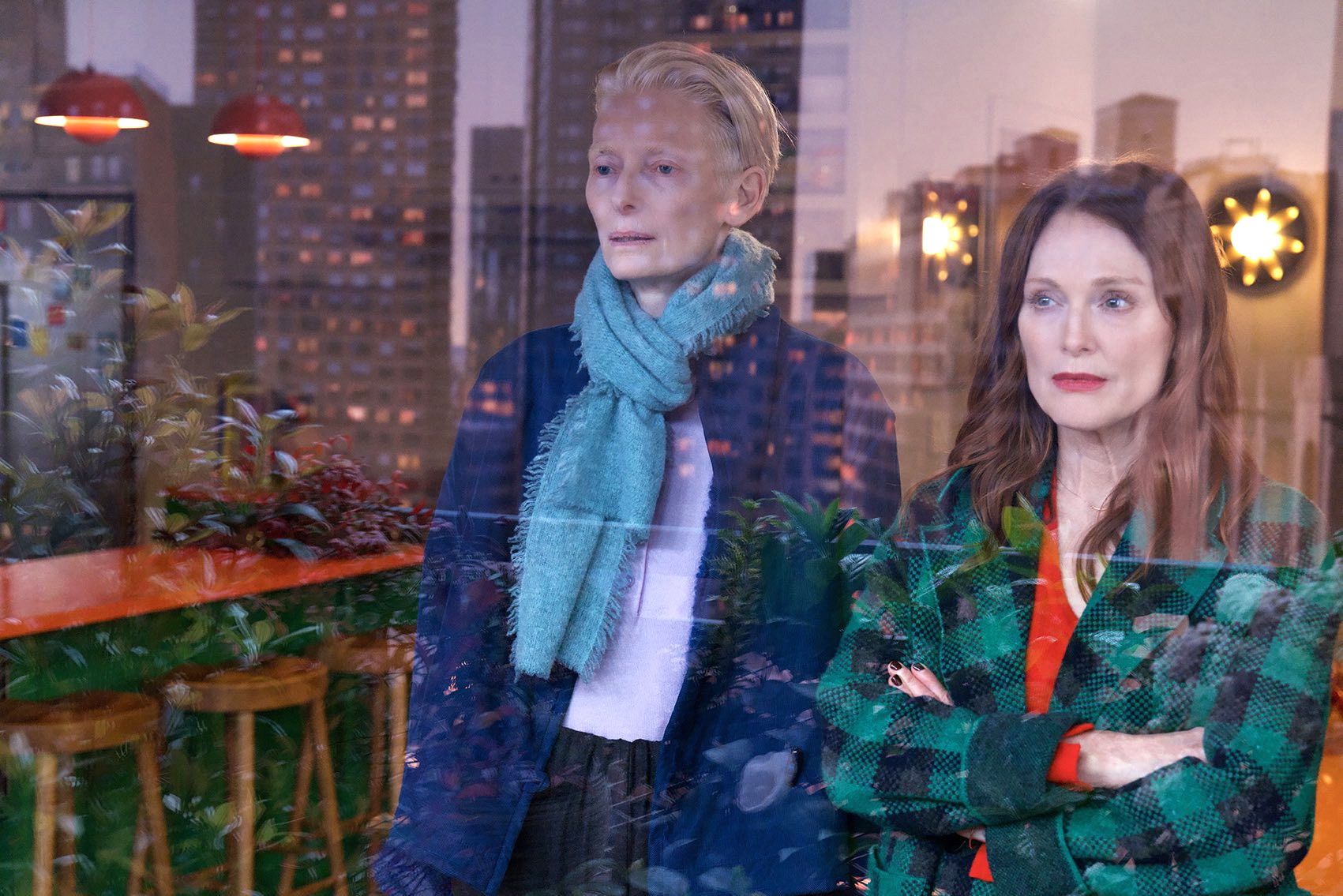Julianne Moore and Tilda Swinton Contemplate Mortality in "The Room Next Door" Spanish director Pedro Almodóvar, known for his vivid exploration of
Julianne Moore and Tilda Swinton Contemplate Mortality in “The Room Next Door”
Spanish director Pedro Almodóvar, known for his vivid exploration of life’s most immediate aspects—love, sex, longing, and regret—has taken audiences on a journey through the human experience throughout his prolific career. While he has occasionally ventured into unexpected territory, he has consistently returned to the core emotions and passions that define his work. Recently, however, Almodóvar’s films have adopted a more reflective tone. His latest works, such as Parallel Mothers and Pain and Glory, delve into themes of endings and farewells. In his newest film, The Room Next Door, which premiered at the Venice Film Festival on Monday, Almodóvar confronts death head-on, yielding both strange and poignant results.
The film is adapted from Sigrid Nunez’s novel What Are You Going Through, which may or may not explore the death of Susan Sontag. Much like Sontag, the character portrayed by Tilda Swinton in Almodóvar’s adaptation is a formidable writer facing her own mortality with a mix of analytical detachment and awe. Martha, a former war correspondent, is battling cervical cancer, and the experimental treatments she has undergone have failed to halt the disease. Determined to take control of her fate, she decides to end her life on her own terms: with a pill procured from the dark web, in a beautifully modernist home she has rented in upstate New York.
Despite her independence, Martha does not want to face her final days alone. She reaches out to an old friend, novelist Ingrid (played by Julianne Moore), and asks her to stay by her side until the day she decides to take the pill and depart from this world. At times, it seems Ingrid doubts Martha’s resolve, perhaps inventing these doubts for her own comfort rather than as a reflection of Martha’s certainty. Ingrid agrees to this somber and melancholic retreat, and the two women head to upstate New York, where they settle into a cozy routine as Martha takes a final inventory of her life and laments what she has already lost.
The Room Next Door marks Almodóvar’s first feature-length film in English, providing him the opportunity to work with two exceptionally talented actresses who fit seamlessly into his style. However, the transition from Spanish to English has its challenges. Much of the dialogue in The Room Next Door feels stilted and overly formal. The characters speak in a manner that feels more scripted than spontaneous, with ideas that seem drawn from a written page rather than from their own thoughts and imaginations.
Yet, as one adjusts to the film’s peculiar rhythm, The Room Next Door begins to resonate deeply. Despite the stiffness of the dialogue, the film’s themes are profound and universal. Almodóvar allows his film to sit with the enormity of Martha’s decision, exploring its many implications. The thoughts that emerge from this contemplation are alternately frightening, sorrowful, and hopeful. While the fear of death is not entirely overcome, acceptance and even a sense of wonder are allowed to surface.
A particularly striking scene occurs when Martha bitterly reflects on how much of her passion for life has faded. Her mind, still weary from chemotherapy, is too exhausted to enjoy reading or listening to music. As a person driven by ideas, it feels as though a door to her mind has closed forever. Who is she, and perhaps who is Almodóvar, without the curiosity and hunger that once defined her? It’s a disconcerting notion—that any of us might one day become strangers to ourselves, that our tastes and passions might not be as fixed as we once believed.
The film also offers solace in a scene where Ingrid and a former lover, played by John Turturro, share a meal and discuss the pervasive dread that hangs over much of life today. Turturro’s character is particularly concerned about the environment, driven to pessimism about the future. He chastises his son for having a third child, appalled by the irresponsibility of bringing someone new into a dying world. While his viewpoint is starkly pragmatic, Ingrid’s response—that there are many ways to live amidst tragedy and catastrophe—offers a glimmer of practical optimism. Though this optimism may not fix anything or stave off impending ruin, it at least allows for moments of fleeting grace.
Despite the film’s somber themes, The Room Next Door does not seek to depress its audience. Instead, it offers a cathartic and refreshing experience, transforming these dark topics into delicate poetry. Almodóvar draws viewers in, reassuring them that they are not alone in their fears. By acknowledging our shared anxieties, the film makes these fears a little less daunting. And then, amid the gravity of the story, something amusing happens, or a beautiful image of vibrant color appears, and we are swept away by the grand distraction that is life itself.
Sari Albeder – Venice Film Festival 2024 – Venezia 81

COMMENTS